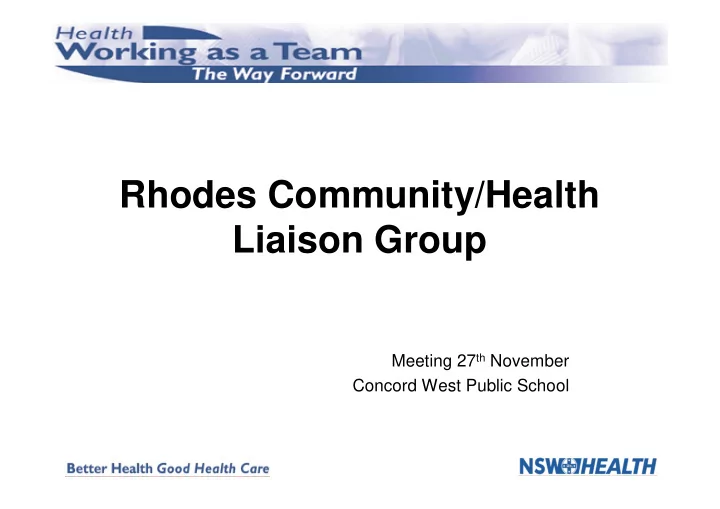

Rhodes Community/Health Liaison Group Meeting 27 th November Concord West Public School
Background • NSW Health involved since mid-1980 ’ s • One of the primary goals of NSW Health is to protect the health of the public • We achieve this through advice to other government agencies and community liaison.
Overview of presentation: Historical cancer study – discussion Dioxin serum study – discussion
Rhodes historical cancer study • Background: Part of the community liaison process involved NSW health responding to concerns from residents that previous practices at the Union Carbide plant had resulted in an increased rate of cancer in the local community. • Purpose: To determine if there was a difference in rates of and death due to cancer in people living close to the Union Carbide site, compared to NSW and compared to Ryde and Concord local government areas.
What did we do? • Define study area – 20 collector districts were selected within 1.5km of the former union carbide site • NSW Cancer Registry supplied data on cases of cancer and deaths from cancer for the years 1972- 2001 • All cancers, lung and bronchus carcinoma & hemopoietic cancers (such as leukaemia and lymphoma).
Study area • Map with collector districts
What did we find? • Overall, we found no difference in rates of cancer or deaths from cancer between the study area compared with the rest of NSW and compared with Ryde and Concord statistical local areas.
Rates of cancer in the study area compared to control areas Standardised Standardised Standardised Standardised Incidence ratio in Incidence ratio in mortality ratio in mortality ratio in study area study area study area study area compared with compared with compared with compared with NSW Concord and NSW Concord and Ryde Ryde (95% confidence (95% confidence interval) (95% confidence interval) (95% confidence Type of cancer interval) interval) All cancers 87.57 90.50 88.72 92.87 (82.48-92.89) (85.24-95.99) (81.28-96.65) (85.09-101.17) Lung and bronchus cancer 105.46 115.70 107.09 116.19 (88.89-124.24) (97.51-136.29) (88.86-127.96) (96.41-138.84) Leukaemia and lymphoma 80.55 74.98 80.82 78.29 (64.34-99.6) (59.89-92.71) (59.17-107.8) (57.32-104.43)
Conclusion • There is no evidence that dioxin from the Union Carbide plant resulted in increased cancer rates in the study area.
Dioxin Serum Survey
Serum Survey • Background – Some members of the community are concerned that the control process during remediation may not be strict enough, and that they will be exposed to dioxins during the clean up. They would like some guarantee after the clean up is finished that their long-term health has not been adversely affected. • Purpose – The aim of this study is to determine if there is a change in community blood dioxin levels before and after the works on the peninsula.
Methods • Three phases – Baseline – After peak remediation (approximately 2 years) – After remediation complete (?5 years)
Methods continued RHODES TEST GROUP • 200 volunteers - complete a brief questionnaire and donate 50ml blood at baseline • Males 30-45, 45-60, 60+ • Females 45-60, 60+ • Collect another 50ml of blood from same people at 2 years and 5 years.
Methods continued CONTROL GROUP • 1100 volunteers from Red Cross Blood Bank (Clarence St) - complete a brief questionnaire and donate 5ml blood at baseline. • Matched to test group by age and sex. • Exclude postcodes 2138 and 2114. • Collect another 5ml of blood from same people at 2 years and 5 years.
Dioxin analysis • All blood samples frozen and stored • Blood samples pooled at the end of the study • Analysis of pooled samples dioxin levels performed
What results can we expect? • We expect to see dioxin levels in these age groups to be quite stable, or to increase slightly to over time. • What we look for is if these levels increase at a rate greater than that seen in the control group.
Limitations: • There are many. • The study will not provide individual results. • The study does not measure any health effects. • The study cannot provide results until after the remediation has occurred. • Dependant on adequate numbers of participants. • Dependant on funding.
More information? • Newsletter is available at: www.health.nsw.gov.au • Cancer study report is currently under peer review - will be available in early 2004 • Serum survey should commence in early 2004. • Any questions/comments or to register interest in serum survey ph:9816 0244
Recommend
More recommend